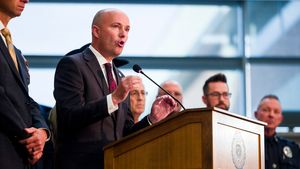Tom MacMaster, an American man from Georgia, has confessed to writing the blog A Gay Girl in Damascus, after a weeklong hunt following the alleged kidnapping of its fictitious author, Amina Arraf.
Identifying himself as the “sole author of all posts on this blog,” MacMaster posted a note on June 12 under the name “Amina A.” in which he apologized for the deception but insisted he acted in the interest of raising awareness around important issues. As the popular uprising and violence in Syria intensified this spring, the lesbian “Amina” acquired readers around the globe by writing frankly against the government of President Bashar al-Assad and about her sexual orientation, which is punishable by death in some parts of the Arab world.
“I never expected this level of attention,” wrote MacMaster, 40, in the brief note. “While the narrative voıce may have been fictional, the facts on thıs blog are true and not mısleading as to the situation on the ground. I do not believe that I have harmed anyone -- I feel that I have created an important voice for issues that I feel strongly about.”
Last week, in a post to the blog by someone identified as a cousin, Arraf was reported kidnapped on the streets of Damascus by pro-Assad forces. The report created a global outpouring of concern and prompted calls for the U.S. State Department to assist Arraf, believed to be an American-Syrian citizen, but the agency was never able to confirm her identity. News organizations including NPR were unable to locate anyone who personally knew Arraf, and a widely circulated photograph of her turned out to be that of a woman in London.
According to The Washington Post, "MacMaster, a Middle East peace activist who is now working on his master's degree at the University of Edinburgh in Scotland, wrote that he fictionalized the account of a gay woman in Syria to illuminate the situation for a Western audience."
In using a blog to execute the hoax, MacMaster exploited the same technology that has helped draw widespread attention to the uprisings against autocratic regimes across the Middle East this year. Activists have relied on social media such as Facebook and Twitter to organize and promote their demands for democratic change.
“I only hope that people pay as much attention to the people of the Middle East and their struggles in thıs year of revolutions,” wrote MacMaster, who is married to a woman. “The events there are beıng shaped by the people living them on a daily basis. I have only tried to illuminate them for a western audience.”
“This experience has sadly only confirmed my feelings regarding the often superficial coverage of the Middle East and the pervasiveness of new forms of liberal Orientalism,” he wrote.























































































 Cindy Ord/Getty Images
Cindy Ord/Getty Images

























